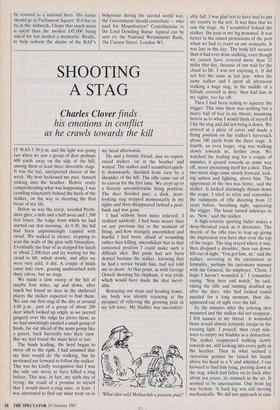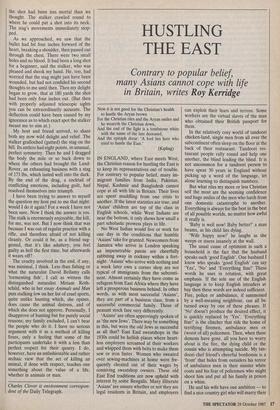SHOOTING A STAG
Charles Clover finds
his emotions in conflict as he crawls towards the kill
IT WAS 5.30 p.m. and the light was going fast when we saw a group of deer perhaps 600 yards away on the side of the hill, among them at least three shootable stags. It was the last, unexpected chance of the week. My host beckoned me past, himself sinking into the heather. Before really comprehending what was happening, I was crawling reluctantly behind the heels of the stalker, on the way to shooting the first beast of my life.
Below us was the steep, wooded Perth- shire glen; a mile and a half away and 1,500 feet lower, the lodge from which we had started out that morning. At 9.30, the hill had been unpromisingly capped with cloud. We walked in silence, stopping to scan the walls of the glen with binoculars. Eventually the four of us stopped for lunch at about 2,500.feet and lay waiting for the cloud to lift, which slowly, and after we were very cold, it did. A couple of hinds came into view, grazing undisturbed with their calves, but no stags.
We made a slow sweep of the hill of maybe four miles, up and down, after lunch but found no deer in the sheltered places the stalker expected to find them. We saw our first stag of the day at around 4.00 p.m., part of a group of about 200 deer which looked up edgily as we peered gingerly over the ridge far above them, as we had unwittingly pushed a small group of hinds, far out ahead of the main group like a patrol, back hurriedly into their view. But we had found the main herd at last.
The hinds leading, the herd began to move off to the right. I had assumed that my host would do the stalking, but he motioned me forward to follow the stalker. This was his kindly recognition that I was the only one never to have killed a stag before. This was, in fact, my sixth day of trying: the result of a promise to myself that I would shoot a stag once, at least. I was interested to find out what went on in my head afterwards.
He and a female friend, also an experi- enced stalker, sat in the heather and waited. The stalker and I scrambled quick- ly downwards, shielded from view by a shoulder of the hill. The rifle came out of its canvas for the first time. We crept up to a fiercely uncomfortable firing position. The deer flooded past; a dark, poor- looking stag stopped momentarily in my sights and then disappeared behind a peat- bank and was gone.
I had seldom been more relieved, I realised suddenly. I had been nearer than on any previous day to the moment of firing, and how strangely unconfident and fearful I had been: afraid of wounding rather than killing, unconfident that in that contorted position I could make such a difficult shot. But pride had not been dented because the stalker, knowing that he had a novice beside him, had not told me to shoot. At that point, as with George Orwell shooting his elephant, it was pride which would have made the shgt inevit- able.
Retracing our steps and heading home, my body was silently rejoicing at the prospect of relieving the growing pain in my left knee. My bladder was uncomfort- 'What idiot sold Methuselah a pension plan?' ably full. I was glad not to have had to put my resolve to the test. It was then that we saw the stags. As I scrambled behind the stalker, the pain in my leg mounted. It was better in the raised protrusions of the peat when we had to crawl on our stomachs. It was late in the day. The body felt wearier than it had ever done stalking, even though we cannot have covered more than 12 miles that day, because of our wait for the cloud to lift. I was not enjoying it. It did not feel the same as last year, when the same stalker and I spent all afternoon stalking a huge stag, in the middle of a hillside covered in deer, then had him in my sights, too far off.
Then I had been itching to squeeze the trigger. This time there was nothing but a heavy ball of fear in my throat; mounting horror as to what I would think of myself if I hit the stag and did not bring it down. We arrived at a piece of cover and made a firing position on the stalker's haversack about 180 yards from the three stags. A fourth, an even larger, stag was walking slowly towards us, further away. We watched the leading stag for a couple of minutes; it grazed towards us some way off, never presenting itself for a shot. Then two more stags came slowly forward, lock- ing antlers and fighting, above him. The uppermost of the two was better, said the stalker. It looked alarmingly distant down the scope. I tried to relax and remember the rudiments of rifle shooting from 12 years before, breathing right, squeezing the trigger. The beast turned sideways to us. 'Now,' said the stalker.
A high-velocity sporting bullet makes a deep-throated crack as it detonates. The muzzle of the rifle tries to leap up giving the impression you have shot over the top of the target. The stag stayed where it was, then dropped a shoulder, then ran down- hill out of sight. 'You got him, sir,' said the stalker, reverting in his excitement to formality, perhaps his customary manner with the General, his employer. 'Christ, I hope I haven't wounded it,' I remember saying. 'Stay here and watch,' he said, taking the rifle and running doubled up after the deer, who had looked round puzzled for a long moment, then dis- appeared out of sight over the hill.
As the minutes after the echoing shot mounted and the stalker did not reappear, I felt nausea in my throat. A wounded beast would almost certainly escape in the evening light. I prayed, then crept side- ways to empty my bladder as a distraction. The stalker reappeared walking slowly towards me, still looking into every gully in the heather. Then in what seemed a victorious gesture he raised his hands above his head in a V and whistled. I ran forward to find him lying, peering down at the stag, which had fallen on its back after about ten paces, its stomach in the air. It seemed to be unconscious. One front leg was broken. A back leg was still moving mechanically. We did not approach in case the shot had been less mortal than we thought. The stalker crawled round to where he could put a shot into its neck. The stag's movements immediately stop- ped.
As we approached, we saw that the bullet had hit four inches forward of the heart, breaking a shoulder, then passed out through the chest. There were two small holes and no blood. It had been a long shot for a beginner, said the stalker, who was pleased and shook my hand. He, too, had worried that the stag might just have been wounded, but had not confided his second thoughts to me until then. Then my delight began to grow, that at 180 yards the shot had been only four inches out. (But then with properly adjusted telescopic sights you can be extraordinarily accurate. The deflection could have been caused by my ignorance as to which exact spot the stalker meant me to aim at.) My host and friend arrived, to share both my now wild delight and relief. The stalker gralloched (gutted) the stag on the hill. Its antlers had eight points, in unusual, perfect symmetry. Then he and I dragged the body the mile or so back down to where the others had brought the Land- Rover, an exhausting business with a stag of 173 lbs, which lasted well into the dark. By the end of the drag, a cocktail of conflicting emotions, including guilt, had resolved themselves into triumph.
I have been trying to answer to myself the question my host put to me that night: would I do it again? For a week I have not been sure. Now I think the answer is yes. The stalk is enormously enjoyable, the kill, for me, was not. But I now think that was because I was out of regular practice with a rifle, and therefore afraid of not killing cleanly. Or could it be, as a friend sug- gested, that it's like adultery; you feel guilty as hell the first time, but afterwards it wears off?
The cruelty involved in the end, if any, was minimal, I think. Less than fishing or what the naturalist David Bellamy calls `tormenting fish'. I call as witness the distinguished naturalist Miriam Roth- schild, who in her essay Animals and Man puts stalking low on her list of cruel sports, quite unlike hunting which, she opines, does cause the animal distress, and of which she does not approve. Personally, I disapprove of hunting but for purely social reasons; my family excluded, I can't bear the people who do it. I have no serious argument with it as a method of killing foxes, only a feeling that some of the participants undertake it with a less than perfect respect for their quarry. I do, however, have an unfashionable and rather archaic view that the act of killing an animal, if done with respect, teaches one something about the value of a life, whether in animals or man.
Charles Clover is environment correspon- dent of the Daily Telegraph.



















































 Previous page
Previous page